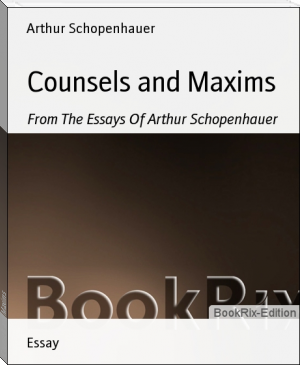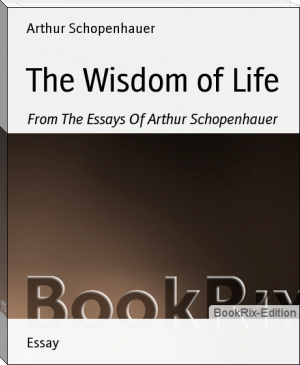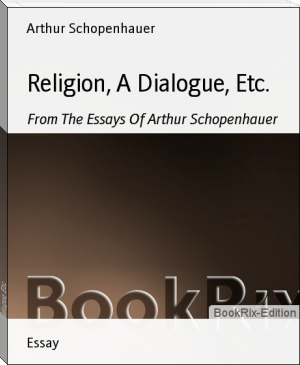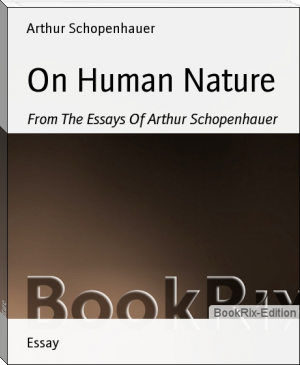Counsels and Maxims - Arthur Schopenhauer (dar e dil novel online reading TXT) 📗

- Author: Arthur Schopenhauer
Book online «Counsels and Maxims - Arthur Schopenhauer (dar e dil novel online reading TXT) 📗». Author Arthur Schopenhauer
in regard to its inner nature, which is
will , - pain and trouble predominate. I may be allowed to express the matter, briefly, thus: the world is glorious to look at, but dreadful in reality .
[Footnote 1: Die Welt als Wille und Vorstellung , Bk. II. c. 31, p. 426-7 (4th Edit.), to which the reader is referred for a detailed explanation of my meaning.]
Accordingly, we find that, in the years of childhood, the world is much better known to us on its outer or objective side, namely, as the presentation of will, than on the side of its inner nature, namely, as the will itself. Since the objective side wears a pleasing aspect, and the inner or subjective side, with its tale of horror, remains as yet unknown, the youth, as his intelligence develops, takes all the forms of beauty that he sees, in nature and in art, for so many objects of blissful existence; they are so beautiful to the outward eye that, on their inner side, they must, he thinks, be much more beautiful still. So the world lies before him like another Eden; and this is the Arcadia in which we are all born.
A little later, this state of mind gives birth to a thirst for real life - the impulse to do and suffer - which drives a man forth into the hurly-burly of the world. There he learns the other side of existence - the inner side, the will, which is thwarted at every step. Then comes the great period of disillusion, a period of very gradual growth; but once it has fairly begun, a man will tell you that he has got over all his false notions - l'âge des illusions est passé ; and yet the process is only beginning, and it goes on extending its sway and applying more and more to the whole of life.
So it may be said that in childhood, life looks like the scenery in a theatre, as you view it from a distance; and that in old age it is like the same scenery when you come up quite close to it.
And, lastly, there is another circumstance that contributes to the happiness of childhood. As spring commences, the young leaves on the trees are similar in color and much the same in shape; and in the first years of life we all resemble one another and harmonize very well. But with puberty divergence begins; and, like the radii of a circle, we go further and further apart.
The period of youth, which forms the remainder of this earlier half of our existence - and how many advantages it has over the later half! - is troubled and made miserable by the pursuit of happiness, as though there were no doubt that it can be met with somewhere in life, - a hope that always ends in failure and leads to discontent. An illusory image of some vague future bliss - born of a dream and shaped by fancy - floats before our eyes; and we search for the reality in vain. So it is that the young man is generally dissatisfied with the position in which he finds himself, whatever it may be; he ascribes his disappointment solely to the state of things that meets him on his first introduction to life, when he had expected something very different; whereas it is only the vanity and wretchedness of human life everywhere that he is now for the first time experiencing.
It would be a great advantage to a young man if his early training could eradicate the idea that the world has a great deal to offer him. But the usual result of education is to strengthen this delusion; and our first ideas of life are generally taken from fiction rather than from fact.
In the bright dawn of our youthful days, the poetry of life spreads out a gorgeous vision before us, and we torture ourselves by longing to see it realized. We might as well wish to grasp the rainbow! The youth expects his career to be like an interesting romance; and there lies the germ of that disappointment which I have been describing.[1] What lends a charm to all these visions is just the fact that they are visionary and not real, and that in contemplating them we are in the sphere of pure knowledge, which is sufficient in itself and free from the noise and struggle of life. To try and realize those visions is to make them an object of will - a process which always involves pain.[2]
[Footnote 1: Cf. loc. cit., p. 428.]
[Footnote 2: Let me refer the reader, if he is interested in the subject, to the volume already cited, chapter 37.]
If the chief feature of the earlier half of life is a never-satisfied longing after happiness, the later half is characterized by the dread of misfortune. For, as we advance in years, it becomes in a greater or less degree clear that all happiness is chimerical in its nature, and that pain alone is real. Accordingly, in later years, we, or, at least, the more prudent amongst us, are more intent upon eliminating what is painful from our lives and making our position secure, than on the pursuit of positive pleasure. I may observe, by the way, that in old age, we are better able to prevent misfortunes from coming, and in youth better able to bear them when they come.
In my young days, I was always pleased to hear a ring at my door: ah! thought I, now for something pleasant. But in later life my feelings on such occasions were rather akin to dismay than to pleasure: heaven help me! thought I, what am I to do? A similar revulsion of feeling in regard to the world of men takes place in all persons of any talent or distinction. For that very reason they cannot be said properly to belong to the world; in a greater or less degree, according to the extent of their superiority, they stand alone. In their youth they have a sense of being abandoned by the world; but later on, they feel as though they had escaped it. The earlier feeling is an unpleasant one, and rests upon ignorance; the second is pleasurable - for in the meantime they have come to know what the world is.
The consequence of this is that, as compared with the earlier, the later half of life, like the second part of a musical period, has less of passionate longing and more restfulness about it. And why is this the case Simply because, in youth, a man fancies that there is a prodigious amount of happiness and pleasure to be had in the world, only that it is difficult to come by it; whereas, when he becomes old, he knows that there is nothing of the kind; he makes his mind completely at ease on the matter, enjoys the present hour as well as he can, and even takes a pleasure in trifles.
The chief result gained by experience of life is clearness of view . This is what distinguishes the man of mature age, and makes the world wear such a different aspect from that which it presented in his youth or boyhood. It is only then that he sees things quite plain, and takes them for that which they really are: while in earlier years he saw a phantom-world, put together out of the whims and crotchets of his own mind, inherited prejudice and strange delusion: the real world was hidden from him, or the vision of it distorted. The first thing that experience finds to do is to free us from the phantoms of the brain - those false notions that have been put into us in youth.
To prevent their entrance at all would, of course, be the best form of education, even though it were only negative in aim: but it would be a task full of difficulty. At first the child's horizon would have to be limited as much as possible, and yet within that limited sphere none but clear and correct notions would have to be given; only after the child had properly appreciated everything within it, might the sphere be gradually enlarged; care being always taken that nothing was left obscure, or half or wrongly understood. The consequence of this training would be that the child's notions of men and things would always be limited and simple in their character; but, on the other hand, they would be clear and correct, and only need to be extended, not to be rectified. The same line might be pursued on into the period of youth. This method of education would lay special stress upon the prohibition of novel reading; and the place of novels would be taken by suitable biographical literature - the life of Franklin, for instance, or Moritz' Anton Reiser .[1]
[Footnote 1: Translator's Note . - Moritz was a miscellaneous writer of the last century (1757-93). His Anton Reiser , composed in the form of a novel, is practically an autobiography.]
In our early days we fancy that the leading events in our life, and the persons who are going to play an important part in it, will make their entrance to the sound of drums and trumpets; but when, in old age, we look back, we find that they all came in quite quietly, slipped in, as it were, by the side-door, almost unnoticed.
From the point of view we have been taking up until now, life may be compared to a piece of embroidery, of which, during the first half of his time, a man gets a sight of the right side, and during the second half, of the wrong. The wrong side is not so pretty as the right, but it is more instructive; it shows the way in which the threads have been worked together.
Intellectual superiority, even if it is of the highest kind, will not secure for a man a preponderating place in conversation until after he is forty years of age. For age and experience, though they can never be a substitute for intellectual talent, may far outweigh it; and even in a person of the meanest capacity, they give a certain counterpoise to the power of an extremely intellectual man, so long as the latter is young. Of course I allude here to personal superiority, not to the place a man may gain by his works.
And on passing his fortieth year, any man of the slightest power of mind - any man, that is, who has more than the sorry share of intellect with which Nature has endowed five-sixths of mankind - will hardly fail to show some trace of misanthropy. For, as is natural, he has by that time inferred other people's character from an examination of his own; with the result that he has been gradually disappointed to find that in the qualities of the head or in those of the heart - and usually in both - he reaches a level to which they do not attain; so he gladly avoids having anything more to do with them. For it may be said, in general, that every man will love or hate solitude - in other Words, his own society - just in proportion as he is worth anything in himself. Kant has some remarks upon this kind of misanthropy in his
Critique of the Faculty of Judgment .[1]
[Footnote 1: Kritik der Urtheilskraft , Part I, §29, Note ad fin.]
In a young man, it is a bad sign, as well from an intellectual as from a moral point
will , - pain and trouble predominate. I may be allowed to express the matter, briefly, thus: the world is glorious to look at, but dreadful in reality .
[Footnote 1: Die Welt als Wille und Vorstellung , Bk. II. c. 31, p. 426-7 (4th Edit.), to which the reader is referred for a detailed explanation of my meaning.]
Accordingly, we find that, in the years of childhood, the world is much better known to us on its outer or objective side, namely, as the presentation of will, than on the side of its inner nature, namely, as the will itself. Since the objective side wears a pleasing aspect, and the inner or subjective side, with its tale of horror, remains as yet unknown, the youth, as his intelligence develops, takes all the forms of beauty that he sees, in nature and in art, for so many objects of blissful existence; they are so beautiful to the outward eye that, on their inner side, they must, he thinks, be much more beautiful still. So the world lies before him like another Eden; and this is the Arcadia in which we are all born.
A little later, this state of mind gives birth to a thirst for real life - the impulse to do and suffer - which drives a man forth into the hurly-burly of the world. There he learns the other side of existence - the inner side, the will, which is thwarted at every step. Then comes the great period of disillusion, a period of very gradual growth; but once it has fairly begun, a man will tell you that he has got over all his false notions - l'âge des illusions est passé ; and yet the process is only beginning, and it goes on extending its sway and applying more and more to the whole of life.
So it may be said that in childhood, life looks like the scenery in a theatre, as you view it from a distance; and that in old age it is like the same scenery when you come up quite close to it.
And, lastly, there is another circumstance that contributes to the happiness of childhood. As spring commences, the young leaves on the trees are similar in color and much the same in shape; and in the first years of life we all resemble one another and harmonize very well. But with puberty divergence begins; and, like the radii of a circle, we go further and further apart.
The period of youth, which forms the remainder of this earlier half of our existence - and how many advantages it has over the later half! - is troubled and made miserable by the pursuit of happiness, as though there were no doubt that it can be met with somewhere in life, - a hope that always ends in failure and leads to discontent. An illusory image of some vague future bliss - born of a dream and shaped by fancy - floats before our eyes; and we search for the reality in vain. So it is that the young man is generally dissatisfied with the position in which he finds himself, whatever it may be; he ascribes his disappointment solely to the state of things that meets him on his first introduction to life, when he had expected something very different; whereas it is only the vanity and wretchedness of human life everywhere that he is now for the first time experiencing.
It would be a great advantage to a young man if his early training could eradicate the idea that the world has a great deal to offer him. But the usual result of education is to strengthen this delusion; and our first ideas of life are generally taken from fiction rather than from fact.
In the bright dawn of our youthful days, the poetry of life spreads out a gorgeous vision before us, and we torture ourselves by longing to see it realized. We might as well wish to grasp the rainbow! The youth expects his career to be like an interesting romance; and there lies the germ of that disappointment which I have been describing.[1] What lends a charm to all these visions is just the fact that they are visionary and not real, and that in contemplating them we are in the sphere of pure knowledge, which is sufficient in itself and free from the noise and struggle of life. To try and realize those visions is to make them an object of will - a process which always involves pain.[2]
[Footnote 1: Cf. loc. cit., p. 428.]
[Footnote 2: Let me refer the reader, if he is interested in the subject, to the volume already cited, chapter 37.]
If the chief feature of the earlier half of life is a never-satisfied longing after happiness, the later half is characterized by the dread of misfortune. For, as we advance in years, it becomes in a greater or less degree clear that all happiness is chimerical in its nature, and that pain alone is real. Accordingly, in later years, we, or, at least, the more prudent amongst us, are more intent upon eliminating what is painful from our lives and making our position secure, than on the pursuit of positive pleasure. I may observe, by the way, that in old age, we are better able to prevent misfortunes from coming, and in youth better able to bear them when they come.
In my young days, I was always pleased to hear a ring at my door: ah! thought I, now for something pleasant. But in later life my feelings on such occasions were rather akin to dismay than to pleasure: heaven help me! thought I, what am I to do? A similar revulsion of feeling in regard to the world of men takes place in all persons of any talent or distinction. For that very reason they cannot be said properly to belong to the world; in a greater or less degree, according to the extent of their superiority, they stand alone. In their youth they have a sense of being abandoned by the world; but later on, they feel as though they had escaped it. The earlier feeling is an unpleasant one, and rests upon ignorance; the second is pleasurable - for in the meantime they have come to know what the world is.
The consequence of this is that, as compared with the earlier, the later half of life, like the second part of a musical period, has less of passionate longing and more restfulness about it. And why is this the case Simply because, in youth, a man fancies that there is a prodigious amount of happiness and pleasure to be had in the world, only that it is difficult to come by it; whereas, when he becomes old, he knows that there is nothing of the kind; he makes his mind completely at ease on the matter, enjoys the present hour as well as he can, and even takes a pleasure in trifles.
The chief result gained by experience of life is clearness of view . This is what distinguishes the man of mature age, and makes the world wear such a different aspect from that which it presented in his youth or boyhood. It is only then that he sees things quite plain, and takes them for that which they really are: while in earlier years he saw a phantom-world, put together out of the whims and crotchets of his own mind, inherited prejudice and strange delusion: the real world was hidden from him, or the vision of it distorted. The first thing that experience finds to do is to free us from the phantoms of the brain - those false notions that have been put into us in youth.
To prevent their entrance at all would, of course, be the best form of education, even though it were only negative in aim: but it would be a task full of difficulty. At first the child's horizon would have to be limited as much as possible, and yet within that limited sphere none but clear and correct notions would have to be given; only after the child had properly appreciated everything within it, might the sphere be gradually enlarged; care being always taken that nothing was left obscure, or half or wrongly understood. The consequence of this training would be that the child's notions of men and things would always be limited and simple in their character; but, on the other hand, they would be clear and correct, and only need to be extended, not to be rectified. The same line might be pursued on into the period of youth. This method of education would lay special stress upon the prohibition of novel reading; and the place of novels would be taken by suitable biographical literature - the life of Franklin, for instance, or Moritz' Anton Reiser .[1]
[Footnote 1: Translator's Note . - Moritz was a miscellaneous writer of the last century (1757-93). His Anton Reiser , composed in the form of a novel, is practically an autobiography.]
In our early days we fancy that the leading events in our life, and the persons who are going to play an important part in it, will make their entrance to the sound of drums and trumpets; but when, in old age, we look back, we find that they all came in quite quietly, slipped in, as it were, by the side-door, almost unnoticed.
From the point of view we have been taking up until now, life may be compared to a piece of embroidery, of which, during the first half of his time, a man gets a sight of the right side, and during the second half, of the wrong. The wrong side is not so pretty as the right, but it is more instructive; it shows the way in which the threads have been worked together.
Intellectual superiority, even if it is of the highest kind, will not secure for a man a preponderating place in conversation until after he is forty years of age. For age and experience, though they can never be a substitute for intellectual talent, may far outweigh it; and even in a person of the meanest capacity, they give a certain counterpoise to the power of an extremely intellectual man, so long as the latter is young. Of course I allude here to personal superiority, not to the place a man may gain by his works.
And on passing his fortieth year, any man of the slightest power of mind - any man, that is, who has more than the sorry share of intellect with which Nature has endowed five-sixths of mankind - will hardly fail to show some trace of misanthropy. For, as is natural, he has by that time inferred other people's character from an examination of his own; with the result that he has been gradually disappointed to find that in the qualities of the head or in those of the heart - and usually in both - he reaches a level to which they do not attain; so he gladly avoids having anything more to do with them. For it may be said, in general, that every man will love or hate solitude - in other Words, his own society - just in proportion as he is worth anything in himself. Kant has some remarks upon this kind of misanthropy in his
Critique of the Faculty of Judgment .[1]
[Footnote 1: Kritik der Urtheilskraft , Part I, §29, Note ad fin.]
In a young man, it is a bad sign, as well from an intellectual as from a moral point
Free e-book «Counsels and Maxims - Arthur Schopenhauer (dar e dil novel online reading TXT) 📗» - read online now
Similar e-books:





Comments (0)